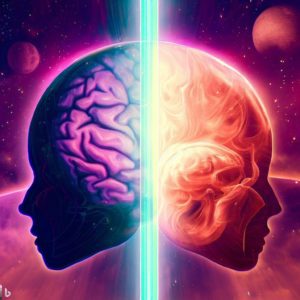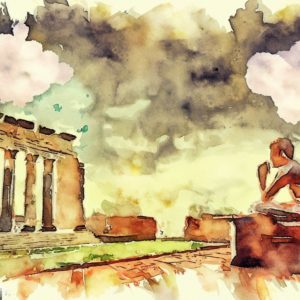Introduction
In the world of spiritual teachings, ideas such as creative thought, the law of attraction, and the secret have gained popularity in recent years. These concepts suggest that through imagination, focus, meditation, and mental exercises, one can manifest their desired life experiences. While these practices have been shown to work, the question remains: is it right or lawful to use them? In this blog post, we delve into the ancient concept of meditating on the microcosm and macrocosm, the teachings of Hermes regarding the correspondence between the two, and the possible consequences of tapping into the forbidden fruit of believing our mind equal to God.
The Power of Creative Thought
Creative thought refers to the idea that through mental exercises and practices, one can bring about desired outcomes in their life. This concept is closely related to the phenomenon of synchronicity, where unrelated events or thoughts align in one’s life.
Microcosm and Macrocosm: Ancient Teachings of Hermes
The ancient concept of meditating on the microcosm and macrocosm refers to the idea that there is a correspondence between the smaller, individual aspects of reality and the larger, universal aspects. This idea was taught by Hermes, who believed that understanding this correspondence could help one gain insight into the nature of God and the universe.
Being Made in the Image of God: The Paradox
The idea of being made in the image of God suggests that we may possess some of the powers of God, such as the ability to create and manifest our desires. However, this idea also presents a potential paradox: if we possess these powers, is it right or lawful for us to use them? And if we do use them, are there penalties and consequences for tapping into this forbidden fruit?
The Forbidden Fruit: Tapping into the Power of Creative Thought
The forbidden fruit, as described in the Bible, refers to the act of disobedience that led to humanity being separated from God. In the context of creative thought and manifestation, tapping into the forbidden fruit could be interpreted as using our inherent powers of creation and manifestation for our own personal gain, rather than for the greater good. This act of selfishness could lead to consequences, such as being separated from the divine and experiencing a spiritual downfall.
Conclusion
While the practices of creative thought, the law of attraction, and the secret have been proven to work, it is essential to consider the possible consequences of using these powers for personal gain. The ancient teachings of Hermes on the microcosm and macrocosm, as well as the idea of being made in the image of God, provide valuable insight into the potential pitfalls of tapping into the forbidden fruit. As we continue to explore these ideas in upcoming episodes and blog posts, it is crucial to keep in mind the importance of using our creative powers responsibly and for the greater good.





